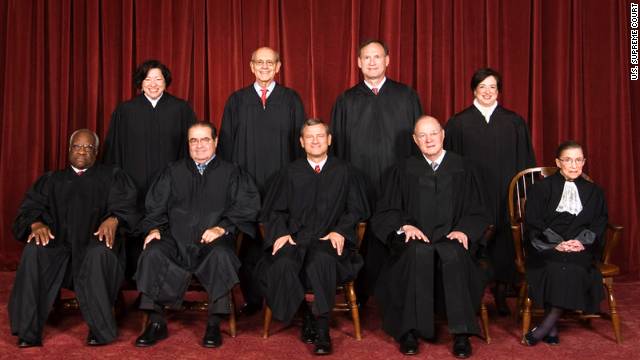
- Paul Sracic says whatever your political bent, you can celebrate Supreme Court's decision
- He says it's evidence that there's still an American institution that is not nakedly partisan
- He says a career Republican, the Chief Justice, cast deciding vote on Dem Obama's law
- Sracic: The example of bipartisan deliberation was much needed in today's political climate
Editor's note: Paul Sracic is a professor and chairman of the Department of Political Science at Youngstown State University in Ohio.
(CNN) -- The Supreme Court begins each session with a proclamation that ends with the words "God save this Honorable Court." Even strict advocates of the separation of Church and State ought to say "Amen" to that line after Thursday's decision upholding the constitutionality of the Affordable Care Act .
I write this as someone who not only thought that the act would be overturned, but also still thinks there are strong constitutional arguments to be made against the mandate. All Americans, however, regardless of their partisan affiliation or views on the Constitution, had something to celebrate Thursday .
Despite what almost all the pundits predicted, the court's decision provides some evidence that there remains one institution of American government that cannot be seen as nakedly partisan. In the end, Chief Justice John Roberts, a career Republican who was nominated for the Supreme Court by George W. Bush, cast the deciding vote upholding the signature act of the current Democratic administration.

This, I think, is what Americans indicated they were looking for when they elected a president in 2008 who, four years earlier, had risen to national prominence by giving a speech in which he took issue with those who would "slice-and-dice our country into red states and blue states."
Unfortunately, the divide between Republicans and Democrats has, if anything, gotten worse over the past 3½ years. Of course, each side blames the other for this result; they are both right. More blame, however, is not what is needed. We used to refer to Congress, or at least the Senate, as the "world's greatest deliberative body." We all know that very little of what might be termed "deliberation" goes on within either chamber nowadays. Instead, Republicans attack Democrats, and Democrats attack Republicans.
To deliberate means to consider something carefully. It means you have to listen to and weigh the position of your opponent. Unfortunately, in today's world, partisans have adopted what amounts to a version of political fundamentalism in which giving any credence to the other side's position is a form of heresy.
But deliberate is exactly what the Supreme Court does. It is a far from perfect process, and yes, the court is affected by politics. As James Madison reminded us, however, neither the government nor the governed are angels. Perfection is not to be expected. Some attempt, however, to think through issues in a nonprejudicial way is required.
Of course, Supreme Court justices have advantages. They do not have to stand for election and, as the chief justice wrote in his opinion read Thursday, they do not have to take a position on whether a law "embodies sound policies."
Nevertheless, the court, and particularly the chief justice, offered an important lesson to the political branches on Thursday on how they might undertake to solve the nation's problems. Will those who serve in the political branches listen? Their initial reactions are certainly not encouraging.
The president and Congress may, however, want to take a look at current approval polls. Although even their numbers have declined lately, the Supreme Court has a much higher http://www.cnn.com Hopefully, the court's numbers will be improved after Thursday's decision. Both the Republicans and Democrats will doubtless find fault with Roberts' opinion, but the example of bipartisan deliberation that the court provided was much needed in today's political climate. "This Honorable Court" deserves our gratitude. Follow us on Twitter: @CNNOpinion. Join us at Facebook/CNNOpinion.
No comments:
Post a Comment